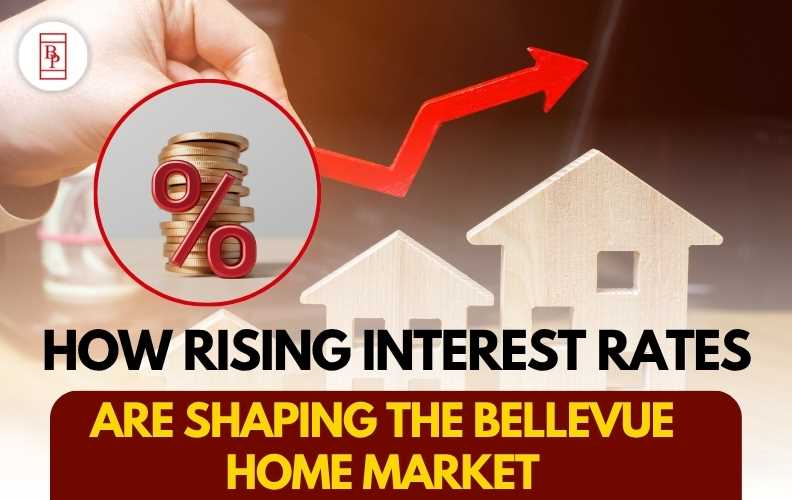How Rising Interest Rates Are Shaping the Bellevue Home Market

 Bellevue, WA has long been a magnet for high-income professionals, tech talent, and savvy investors thanks to its proximity to Seattle, scenic beauty, and thriving local economy. But as we enter the heart of 2025, a new variable is reshaping the local housing landscape—rising interest rates. The ripple effects of increased borrowing costs are being felt across the entire Bellevue housing ecosystem—from sellers and buyers to investors and developers.
Bellevue, WA has long been a magnet for high-income professionals, tech talent, and savvy investors thanks to its proximity to Seattle, scenic beauty, and thriving local economy. But as we enter the heart of 2025, a new variable is reshaping the local housing landscape—rising interest rates. The ripple effects of increased borrowing costs are being felt across the entire Bellevue housing ecosystem—from sellers and buyers to investors and developers.
This blog explores in detail how the rising mortgage rates in Bellevue WA, are influencing market behavior, pricing trends, inventory levels, and what the Bellevue interest rates impact 2025 truly looks like. Whether you're a first-time buyer, a seasoned investor, or a homeowner evaluating your next move, understanding these shifts is crucial to making well-informed real estate decisions.
Understanding the Broader Economic Context
The Federal Reserve initiated aggressive monetary tightening in 2022 in response to soaring inflation levels not seen in decadesSince then, borrowing costs have continued to climb, with the federal funds rate now hovering around 5.5% in 2025—a level not seen since before the 2008 financial crisis. This steady increase has directly translated into higher mortgage rates across the country, including Bellevue.
While the rise in rates may appear like a purely national issue, its impact on local housing markets is far from uniform. Bellevue, known for its robust job market and high demand for housing, presents a unique case study in how these macroeconomic trends filter down to the community level.
The Rise of Mortgage Rates in Bellevue: A Closer Look
To grasp the full picture, consider that mortgage rates in Bellevue hovered around 3.2% in 2021. As of mid-2025, rates have climbed to 6.8% for a 30-year fixed loan. This significant increase means that monthly payments for the same-priced home are now substantially higher.
For example, a $1 million mortgage in 2021 would have cost a buyer approximately $4,300 per month (excluding taxes and insurance). In 2025, the same mortgage could cost over $6,500 monthly—a nearly 50% increase in monthly expense. This dramatic jump is altering what buyers can afford and, consequently, reshaping demand dynamics.
Key Phrase Focus: Rising Mortgage Rates, Bellevue WA
The rising mortgage rates in Bellevue WA, have forced many potential buyers to reconsider their options. First-time homebuyers, in particular, are either scaling down their expectations or opting to continue renting until affordability improves. This is particularly noticeable among younger professionals and families who previously saw Bellevue as an attainable long-term base due to strong schools and community amenities.
Buyers who previously qualified for $1.2 million homes may now only be approved for homes closer to $900,000 due to stricter debt-to-income ratios. As a result, higher-end listings are sitting longer on the market, while mid-priced homes are experiencing a bit more competition, but at a more measured pace than in previous years.
How Sellers Are Adapting
Sellers in Bellevue are facing a distinct challenge known as the "lock-in effect." Homeowners with mortgage rates under 4% are hesitant to list their properties, as making a move, whether to a larger or smaller home would require trading in their low-rate loans for significantly higher interest rates
In 2023, listing inventory was already tight. As we move deeper into 2025, this scarcity has only intensified, limiting choices for buyers and stalling overall market turnover. The result is a market where fewer transactions are happening, but prices have remained somewhat stable due to constrained supply.
Some savvy sellers are attempting to offer rate buydowns or seller-financed options to attract buyers who are wary of today’s high interest rates. These creative solutions reflect how homeowners are adjusting to the Bellevue interest rates' impact in 2025.
Home Prices: Cooling, But Not Crashing
One of the biggest misconceptions is that rising interest rates inevitably lead to falling home prices. While that can be true in some markets, Bellevue has proven more resilient due to its unique demand drivers. A thriving tech scene, nearby headquarters of companies like Microsoft and Amazon, and a steady influx of high-income professionals mean that demand remains strong, even if slightly tempered.
Median home prices in Bellevue peaked in 2022 at approximately $1.4 million. By mid-2025, they will have cooled to around $1.25 million. That’s a notable drop, but not a collapse. In fact, in some high-demand neighborhoods like West Bellevue and Lake Hills, prices have held relatively steady or even shown modest increases.
Bellevue Interest Rates Impact 2025: Who Wins and Who Loses?
The Bellevue interest rates impact in 2025 is multi-faceted and affects different groups in varied ways:
Winners:
-
Cash buyers: With no need to finance, these buyers are in a strong position to negotiate favorable deals.
-
Investors: Long-term investors with capital can take advantage of slower price appreciation and less competition.
-
Sellers of entry-level homes: These properties remain in demand as affordability limits push buyers toward lower price brackets.
Losers:
-
First-time buyers: High borrowing costs significantly limit affordability.
-
Move-up buyers: Existing homeowners hesitate to list due to higher replacement mortgage rates.
-
Luxury market sellers: High-end homes are moving more slowly due to the limited buyer pool that can handle elevated monthly payments.
What This Means for Real Estate Agents and Brokers
For real estate professionals in Bellevue, adapting to these new conditions is critical. Agents must now act more like advisors, guiding clients through rate comparisons, affordability calculators, and creative financing options. Offering partnerships with mortgage brokers, promoting rate buydown strategies, and educating clients about long-term equity gains are more important than ever.
Some agents are even encouraging clients to consider adjustable-rate mortgages (ARMs) or temporary buydowns that make the early years of homeownership more affordable, with the expectation that rates may decline in the next 3–5 years.
Developer and Builder Response to Rising Mortgage Rates
Homebuilders in Bellevue are also recalibrating their strategies in response to increased borrowing costs. In the past, developers focused heavily on luxury condos and single-family homes, targeting the upper-middle class and tech professionals. Today, however, there's a shift toward more modest townhomes and smaller-scale multi-family units aimed at improving affordability.
Some developers are also offering buyer incentives, such as paid closing costs, free upgrades, or partnerships with lenders to offer discounted rates. This is especially relevant as new construction begins to face higher holding costs due to slower sales velocity.
The rising mortgage rates Bellevue WA is not just affecting resale properties—it is influencing the entire lifecycle of housing production, pricing, and marketing strategies.
Future Outlook: What’s Next for Bellevue’s Housing Market?
Looking forward, three key scenarios could unfold in the Bellevue market:
-
Rates Stabilize or Decrease: If the Federal Reserve manages a soft landing and inflation continues to cool, interest rates could begin to decline by late 2025 or early 2026. This would reignite buyer demand and likely increase transaction volume without causing dramatic price spikes.
-
Rates Stay Elevated: If inflation remains sticky, and the Fed keeps rates high, the market will likely continue its current trend—moderated prices, low inventory, and a slower pace of sales.
-
Economic Downturn: In the event of a broader recession, buyer activity could sharply decline, potentially forcing prices down. However, Bellevue’s economic insulation through its tech sector may help it weather such storms better than other areas.
Regardless of which scenario plays out, it’s clear that interest rates will remain a key determining factor in shaping housing trends.
Tips for Buyers and Sellers in 2025
For Buyers:
-
Shop around for mortgage options. A small rate difference can mean hundreds in monthly savings.
-
Consider homes below your budget. It leaves room for surprise expenses or future refinancing.
-
Look for motivated sellers or new construction incentives.
For Sellers:
-
Be realistic about pricing. Overpricing in a high-rate environment can backfire.
-
Offer flexibility. Consider contingencies, rate buydowns, or even rent-to-own models.
-
Invest in curb appeal. With buyers being more selective, small improvements can yield high returns.
Conclusion: A Market in Transition
The rising mortgage rates Bellevue WA phenomenon is reshaping more than just affordability; it’s redefining expectations, strategies, and timelines for everyone involved in the housing process. The Bellevue interest rates impact 2025 is a story of resilience, adaptability, and cautious optimism.
While the market is no longer the frenzy it once was, it still holds solid potential for those who understand its nuances. For buyers, patience and financial discipline are key. For sellers, creative marketing and flexibility will go a long way. And for everyone involved, staying informed and nimble in the face of changing economic winds will remain the best strategy moving forward.